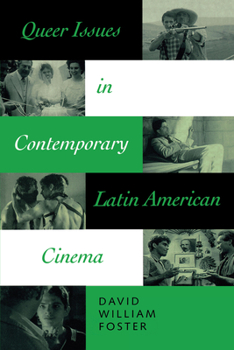Queer Issues in Contemporary Latin American Cinema
Viewing contemporary Latin American films through the lens of queer studies reveals that many filmmakers are exploring issues of gender identity and sexual difference, as well as the homophobia that attempts to defeat any challenge to the heterosexual norms of patriarchal culture. In this study of queer issues in Latin American cinema, David William Foster offers highly perceptive queer readings of fourteen key films to demonstrate how these cultural products promote the principles of an antiheterosexist stance while they simultaneously disclose how homophobia enforces the norms of heterosexuality.
Foster examines each film in terms of the ideology of its narrative discourse, whether homoerotic desire or a critique of patriarchal heterosexism and its implications for Latin American social life and human rights. His analyses underscore the difficulties involved in constructing a coherent and convincing treatment of the complex issues involved in critiquing the patriarchy from perspectives associated with queer studies. The book will be essential reading for everyone working in queer studies and film studies.
The films discussed in this book are:
De eso no se habla (I Don't Want to Talk about It) El lugar sin l mites (The Place without Limits) Aqueles dois (Those Two) Convivencia (Living Together) Conducta impropia (Improper Conduct) The Disappearance of Garc a LorcaLa Virgen de los Sicarios (Our Lady of the Assassins) Do a Herlinda y su hijo (Do a Herlinda and Her Son) No se lo digas a nadie (Don't Tell Anyone) En el para so no existe el dolor (There Is No Suffering in Paradise) A intrusa (The Interloper) Plata quemada (Burnt Money) Afrodita (Aphrodite) Fresa y chocolate (Strawberry and Chocolate)




